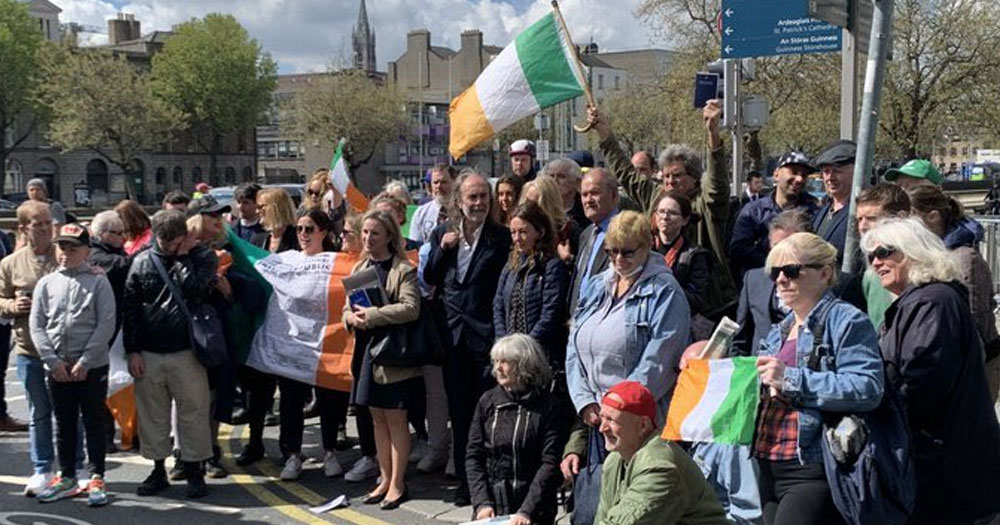Launched yesterday, November 28, the new STOPFARRIGHT project examines the best ways that minority groups can strategise against the rise of the far-right in Ireland.
Authored by Barry Cannon, Richard King, Joseph Munnelly, and Riyad el-Moslemany, the study is a year-long research project by Crosscare Migrant Project in association with Maynooth University’s Sociology department. The report presents findings from an online survey of marginalised groups in Irish society, as well as a series of interviews and webinars with national and international experts on the subject.
GCN caught up with Joseph Munnelly, one of the authors of this study, who offered insight into how the research can help LGBTQ+ organisations find effective strategies to use against the rise of the far-right in Ireland.
Speaking of the STOPFARRIGHT report, Munnelly said that the project “is about addressing the rise of the far-right in Ireland in light of what we are seeing, sadly, across Western Europe. The far-right are becoming prominent within Europe and, as well as mapping out the different forms and key characteristics of the far-right, we wanted to look at how civil society groups and social movements can strategize against this growing threat.”
Far-right actors represent a threat because they share characteristics that are intolerant to all marginalised groups in a society, including the LGBTQ+ community. “The characteristic of ‘Familialism’ is what puts the LGBTQ+ community under fire,” explained the author. “It is a form of bio-politics which views the ‘traditional’ family as the foundation of the nation and controls individual reproductive and self-determination rights, of women and trans men in particular, to the normative demands of the reproduction of the nation.”
The LGB Alliance – an org with a majority straight following launched solely to harass trans people – formally recognised as a Far Right hate organisation.
Should now be stripped of its charity status by the @ChtyCommission*Global Project Against Hate and Extremism pic.twitter.com/tM1QdSP29L
— India Willoughby (@IndiaWilloughby) August 22, 2022
“Far-right groups hold sexist and traditional binary views of gender, and feminism and feminists, as well as LGBTQ+ groups, are viewed very negatively as a result as our very existence dismantles this narrow perspective,” he continued.
Talking about the far-right groups that are emerging in Ireland, Munnelly mentioned Siol na hÉireann, described by the founder Niall McConnell as a “hard line Irish Catholic Nationalist Party”, and the Irish Patriot, a newspaper that “distributes homophobic and transphobic hate as well as strong opposition to bodily autonomy right to people’s doors”.
However, social media is where far-right groups are most active. “There, misinformation and hate is easily created and groups and individuals are emboldened by anonymity and lack of regulation from media platforms,” the researcher explained.
According to Munnelly, these far-right groups share narratives against the LGBTQ+ community that “equate homosexuality with child abuse” and they orchestrate “online abuse and misinformation placing LGBTQ communities directly in the firing line.” He added, “What is quite common is the far-right narrative of being the so-called ‘protectors’ of children from ‘groomers’,” a word often used in anti-LGBTQ+ rhetoric to portray queer people as predatory.

Speaking about the threat posed by the rise of the far-right on LGBTQ+ activists specifically, Munnelly said that the STOPFARRIGHT report highlights how “over 65% have experienced threats or violence from far-right linked individuals and groups. 100% of those surveyed experienced online harassment and threats and 50% experiencing physical violence.
“All participants were asked about the frequency of such attacks over the last five years. Just over 82% answered that such attacks had increased,” he added. “Although the Irish far-right is small, it is minority groups who are at the frontlines, as it were, so such activity is very much present.”
The STOPFARRIGHT research also outlines strategies that civil society organisations can use to counter the rise of the far-right in Ireland. Some of these strategies include:
- attending proactive counter-protests, marches and demonstrations against the far-right or far-right-linked themes
- attending marches and demonstrations in solidarity with minority groups, for example, Trans Pride
- using “inoculation” strategies, whereby organisations anticipate false narratives and false claims made on an issue and clarify them beforehand to the public
For more information, you can find the full STOPFARRIGHT report at this link.
© 2022 GCN (Gay Community News). All rights reserved.
Support GCN
GCN is a free, vital resource for Ireland’s LGBTQ+ community since 1988.
GCN is a trading name of National LGBT Federation CLG, a registered charity - Charity Number: 20034580.
GCN relies on the generous support of the community and allies to sustain the crucial work that we do. Producing GCN is costly, and, in an industry which has been hugely impacted by rising costs, we need your support to help sustain and grow this vital resource.
Supporting GCN for as little as €1.99 per month will help us continue our work as Ireland’s free, independent LGBTQ+ media.

comments. Please sign in to comment.